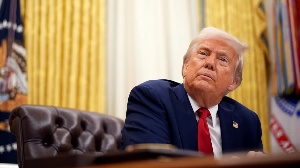- Home - Entertainment
- Lifestyle News
- Year In Review
- Music News
- Entertainers
- Entertainment Archive
- Entertainment Photos
- Jokes
- Entertainment Headlines
- Ameyaw Debrah
- Brown GH
- Celebrities Buzz
- GH Base
- Ghana Celebrities
- Gh Gossip
- GH Page
- GH Splash
- Hot Gossip GH
- YEN
Television of Wednesday, 9 April 2025
Source: www.ghanawebbers.com
As Trump hikes tariffs again, nervous businesses weigh what comes next
US President Donald Trump is changing trade rules that have existed for over 50 years.
His new tariffs took effect shortly after midnight on Wednesday. These tariffs target goods from major trading partners like China and the European Union. The import duties have increased dramatically.
Trump and his supporters argue these measures are necessary. They believe restoring America's manufacturing base is vital for national security.
This action could significantly impact over $2 trillion in imports. It will raise the overall effective tariff rate in the US to its highest level in a century.
Key consumer goods may see large price increases. For example, clothing prices could rise by an estimated 33%. Analysts warn of likely global economic damage as American sales drop, trade shrinks, and foreign production declines.
The stock market is struggling, and political pressure is rising in the US. To ease concerns, the White House has suggested possible trade talks. Conversations have already started with Japan, Vietnam, and South Korea.
However, Trump seems resistant to exemptions he previously granted. Even if talks are productive, reaching agreements will take time.
"The main question is whether there will be negotiations," said Thierry Wizman from Macquarie bank. "No one knows because it depends on how both sides approach negotiations."
The US appears headed for conflict with China, its third-largest supplier last year.
On Tuesday, the White House confirmed plans to impose a further 50% levy on Chinese imports. This would be on top of the existing 54% duties unless China withdraws its retaliation.
Liu Pengyu from the Chinese embassy declined to confirm any direct talks since this threat was made. Publicly, China shows little willingness to back down. They describe Trump's actions as "bullying" and warn against intimidation tactics.
"If the US ignores its own interests and continues this trade war, China's response will persist," Liu stated.
These rapid changes have unsettled US businesses with long-standing ties to China. Many are now uncertain about how this escalating trade fight will end.
"You would laugh if you weren't crying," said Jay Foreman of Basic Fun!, a toy company known for Tonka Trucks and Care Bears made mostly in China.
He instructed suppliers to stop shipments earlier this week due to impending duties starting at 104%. "We just have to hold our shipments until this gets sorted out," he said. "If it doesn't get sorted out, I'll sell my inventory and pray."
During a Congressional address on Tuesday, Jamieson Greer from the US Trade Representative's office did not provide a timeline for talks' progress.
"The president is determined," he said about addressing trade deficits and job losses that have persisted too long. He acknowledged that these measures might lead to a challenging economic adjustment but expressed confidence in Americans' resilience during this drastic change.











